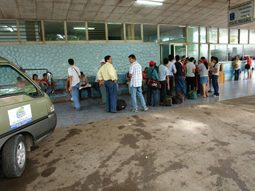
by VANESSA LOAIZA N.
Penas Blancas border is an old, abandoned, dirty and slow. At this northern border crossing it can take up to three hours to complete immigration procedures for entry or exit into Costa Rican territory.
Travelers must wait outside the old building to the elements, enduring the oppressive heat, with no place to sit and no access to health services in order to get their passport stamped.
The only toilets that are available are inside the soda for a cost of ¢100.
Outside, the officers of the security forces coexist with the “hawks” who without any discretion offer the migratory process in exchange for $10.
Meanwhile, in the window, a handwritten sign only in Spanish states to tourists that the process is free.
Last Thursday there were only two staff on duty to handle those exiting Costa Rica and two to receive the immigrants who were coming from Nicaragua.
Three Nicaraguan travelers complained, lying on the dirt floor of Migration, where they had been waiting three days for multiple visas to enter Costa Rican territory.
Their egress was not approved on Thursday afternoon because the only person authorized to sign (the local director of Migration) was out of service attending a funeral.
“This is the most filthy Central American border and the hardest,” stated Luis Acosta, who waited for his visa to enter with a van full of sesame to Puerto Limon.
At 600 yards away, the Nicaraguan side, the border also are dirty, but the transaction is completed in just five minutes.
In addition to the limited staff and long lines, the building was constructed during the administration of Mario Echandi (1958-1962) and is in deplorable condition.
The ceilings are detached, walls unpainted, 90% of the structure is rented to a soda and only the remaining 10% is home to the offices of Immigration.
Since January, the air conditioning does not work. The one that half works is in the office of the director, Idaney Aragon, but on the floor there are three buckets to store the water that falls from the device.
Officials only share one bathroom, the commode is closed and the rest of the space serves as a warehouse of files.
In February, the Ministry of Health declared a health emergency, after the deficiencies identified by the Area Dean of La Cruz.
For example, inadequate sanitation, poor condition of the sink, no emergency lighting, no plan for managing solid waste and a septic tank that overflows and pollutes the river Sapoa.
Mario Zamora, director of Migration and Alien Affairs, acknowledged that staff needed to serve the 30,000 immigrants who cross the border each month and be strengthened with more staff in the days leading to Easter.
Translation by TCRN Staff

